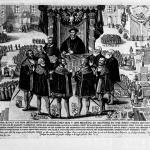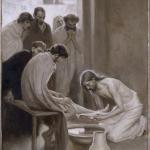Just a little point. The so-called “Vatican investigation of nuns” had as its facilitator a religious sister. This was not a hostile intervention, but a collaborative process seeking revitalization during challenging times.
You can read her prepared statement:
I imagine that each of the women religious here present and those who are following this press conference via internet remember the moment we heard the announcement of the Apostolic Visitation. For me, it began with a totally unexpected phone call from Cardinal Franc Rodé, then Prefect of the Congregation for Consecrated Life. I immediately felt overwhelmed by such an enormous task and keenly aware of my own limitations. At the same time, I knew there could be no other response on my part but yes, in loving obedience to the Church and to the religious life which I deeply love. I tried to carry it out with unwavering faith in the guidance of the Holy Spirit and the support of much prayer.
Throughout the entire Visitation, I not only felt the weight of this responsibility but also the deep trust of the Dicastery. From the outset, Cardinal Rodé clearly wanted an American religious to be the Holy See’s envoy in this delicate mission, giving me free rein to choose my own collaborators to assist in the Visitation’s design, the formulation of its strategies and the ongoing evaluation and modification of the process. He readily agreed to let us establish a first-ever visitation website to keep the women religious and the general public abreast of its developments. Each time I returned to Rome from my U.S. office, he attentively listened to my updates and encouraged our efforts. From the time of Archbishop Joseph Tobin’s appointment as Secretary of the Dicastery in 2010, he always showed great sensitivity to the women religious and intense interest in the process. I thank them as well as Cardinal João Braz de Aviz and Archbishop Carballo, who have brought the Visitation to its completion in a very pastoral manner and have given us a wonderful message of hope today.
My core team of dedicated religious offered invaluable voluntary service to the Apostolic Visitation. Their commitment to the Church and to the values of religious life, as well as their belief in the sacred dignity of every human person enabled the Visitation to take place with profound respect for each individual religious and congregation. I am happy for this opportunity to publicly thank them for their great contribution. I also gratefully acknowledge the wise counsel of various other consultants and the fine service rendered by nearly eighty religious from forty-six congregations who conducted the on-site Visits.
My personal contact with many of the dedicated leaders and members of the religious institutes in our country has filled me with joyful gratitude. I now understand as never before how enriched and blessed the Church in the United States is because of the myriad experiences and gifts of its current fifty thousand women religious and the multitudes of dedicated women who have preceded us.
The Apostolic Visitation provided many opportunities for reflection, dialogue and communion among women religious in the United States as well as with the Church’s pastors and lay faithful. Congregation leaders, including those who expressed resistance initially to this initiative, have shared that the process has yielded surprising positive results, such as:
– honest confrontation with the transformative power of the Word of God,
– deep spiritual conversations with our sisters about the life, witness and message of our foundresses and founders,
– earnest delving into Church documents about consecrated life,
– increased solidarity among women religious and renewed desire to move beyond attitudes which prevent us from being in communion with one another,
– a wonderful outpouring of loving gratitude expressed to women religious by bishops, clergy and lay persons which has sparked new energy and resourcefulness among us and has awakened a renewed interest in the promotion of vocations to the religious life.
Like the major superiors present here today, I too, as superior general of an international institute, have been eagerly awaiting the response of the Congregation for Consecrated Life at the conclusion of the Apostolic Visitation. As the person who conveyed the complex reality of our religious congregations to the Holy See with as much integrity and reverence as was possible, I affirm that the report given to us today reflects my findings in a concise and accurate manner.
I thank Cardinal Braz de Aviz and Archbishop Carballo for hearing our voices, our concerns and our goodwill, and for responding to us with sensitivity, respect and clarity. Your message to us today shows that you do understand our ongoing struggle to faithfully serve the Church in challenging times, despite our shortcomings and limitations. While you affirm the importance of our life and ministry in the Church, you challenge us with clear guidelines for an effective metanoia, the ongoing conversion essential to the effective revitalization of our vocation and life style. Thank you for inviting all of us to continue our open and honest dialogue with one another, with our pastors and with you, so that whatever remains of uncertainty and hesitancy among us might be transformed into collaborative trust and effective witness.
I sincerely hope that the positive energy generated by the Apostolic Visitation will continue to bear fruit in the ongoing revitalization of the vocation and ministry of women religious in the United States. The Visitation has given us a priceless opportunity to renew our commitment to the consecrated life and to place our unique gifts at the service of the Church, as together we confront new and emerging threats to human dignity, religious freedom and conscience protection. May the affirmation and challenges of this final report impel us all to become – as Pope Francis urges us – joyful, Spirit-filled evangelizers who cultivate in prayer the interior space which gives a Christian meaning to our commitment and activity (cf Evangelii Gaudium 262). In true synergy with all other vocations in the Church, may we spread the spirituality of communion in our own communities, in the ecclesial community and in the existential peripheries of a world looking for a purpose in life, thirsting for the divine (cf Pope Francis, Apostolic letter for the Year of Consecrated Life 3-4 ).
My 2010 interview with Mother Mary Clare Millea here.















